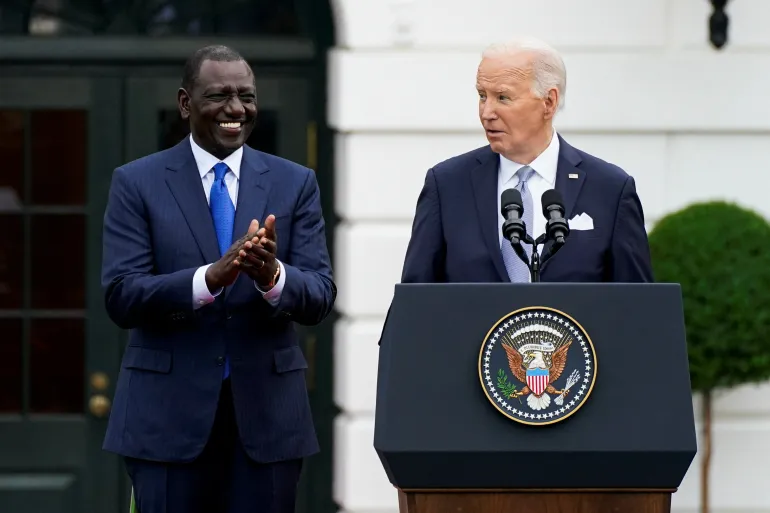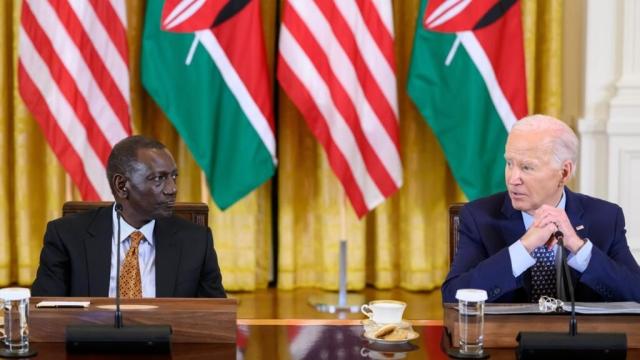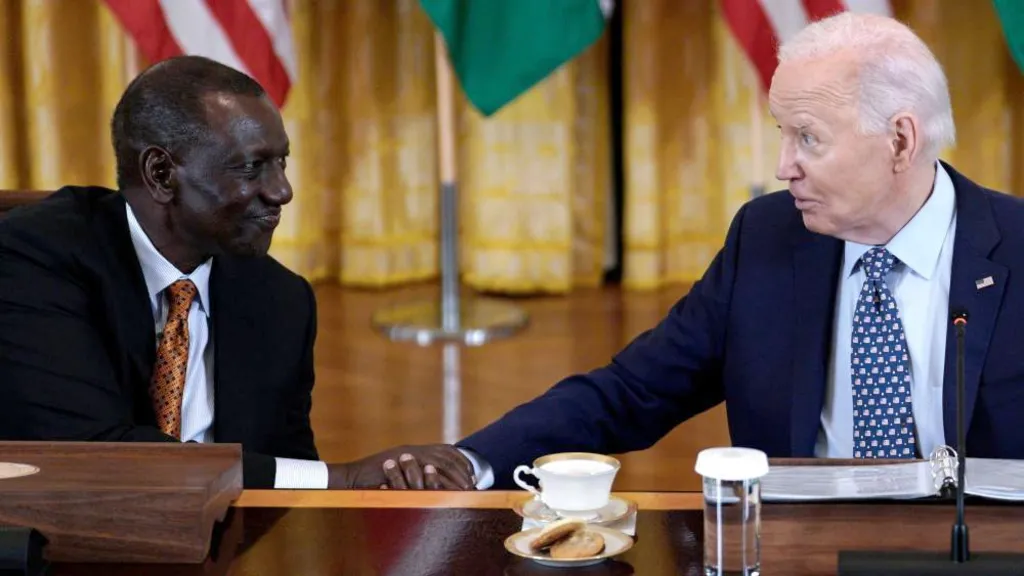
Kenyan President William Ruto is the first African leader in over 15 years to make an official state visit to the United States.
The visit provides President Joe Biden with an opportunity to show a renewed commitment to Africa, especially as Washington seeks to enhance its engagement with the continent amid increasing competition from strategic rivals like Russia and China.
Traditionally, only a select few close allies receive the honor of a state visit to the White House each year.
At one time, President Ruto might have seemed an unlikely candidate for such a reception due to his past.
He faced charges from the International Criminal Court for crimes against humanity related to the violence following Kenya’s 2007 election, but the case collapsed.
Since then, Ruto has transformed his image, becoming a key partner for the US.
Concerns about his democratic credentials are not the reason for the decision against inviting him to address a joint session of Congress, according to US Ambassador to Kenya Meg Whitman.
She attributes it to scheduling issues. Whitman, a former CEO of eBay and Hewlett Packard Enterprises, is an advocate for Kenya’s investment potential, particularly highlighting its burgeoning tech industry, known as Silicon Savannah.
“If you really want to lean into Africa, then who would be the right choice to come to a state dinner?” she asks.
“Kenya has been a long-standing 60-year ally of the United States. It is certainly the most stable democracy in East Africa. President Ruto has stepped up and he’s a real leader.”
Under Mr. Ruto, Kenya has solidified its role as the region’s diplomatic and business hub, becoming an “anchor state” for the US in a challenging area.
Domestically, despite facing protests over his management of the struggling economy, Mr. Ruto has emerged as a global advocate for Africa on issues like climate change and debt relief.
Kenya remains a key security partner in East Africa, earning Washington’s approval by pledging to send Kenyan police to Haiti.
President Biden’s sole phone call to a sub-Saharan African leader last year was to Mr. Ruto, discussing Nairobi’s commitment to lead a multinational force to the troubled country.

Analysts suggest that this state visit partially aims to compensate for Biden’s unfulfilled promise to visit Africa, a pledge made at a summit of African leaders in Washington two years ago.
At that summit, Biden assured his guests he was “all in” for the continent but has since been preoccupied with crises elsewhere, such as the conflicts in Ukraine and Gaza.
The summit was accompanied by the administration’s announcement of a new strategy to foster more equal partnerships with African countries, advancing mutual strategic interests.
In many ways, Mr. Ruto exemplifies this approach, but his visit to Washington comes amidst US setbacks in West Africa. Niger, in particular, epitomizes the challenges facing the US in Africa.
It hosted over 1,000 US troops conducting security operations against Islamist militants from two bases for years.
However, a coup last year altered the relationship, with Niger’s military rulers aligning more closely with Russia and Iran. Efforts to maintain security cooperation collapsed in March, with the junta’s prime minister accusing a senior US delegation of taking a “condescending tone” and disrespecting Niamey’s sovereignty.
READ ALSO: While Tinubu Continues to Search for Investors, Coca-Cola Announces $175m Investment in Kenya
This week, the Pentagon confirmed a complete withdrawal of US troops by September, paving the way for even closer ties between Niger and Moscow.
Molly Phee, the State Department’s top African affairs official, stated that reconciling America’s interests and values, including a timeline for a return to civilian rule, with the junta was impossible.
“We shared legitimate concerns about the trajectory of [Niger’s] discussions with Russia and Iran,” she told the BBC.
“In the end, we were not able to reach an understanding that addressed our top priorities,” she said, noting that the relationship should be reciprocal.
“We intend to maintain a diplomatic partnership, as well as other aspects of our relations.”
The breakdown follows Niger’s expulsion of the French, its former colonial power, highlighting the tensions as the US attempts to balance security partnerships with democratic values—limitations that Russia does not share.
Similar events in other Sahel countries have seen Moscow willingly offering protection to those who seized power in a series of coups, often in exchange for access to natural resources.
Recently, a small contingent of American troops was forced to leave Chad, Niger’s neighbor, after officials questioned the future of the US presence.
The US also faces increasing competition from other nations on the continent. China has been investing in Africa for two decades, and now a range of new middle-power players are joining the fray.
A Gallup poll last year showed that the US had lost its soft power edge while China had gained popularity, with the most significant rise in favorability being Russia’s. “Historically, the West has seen Africa as a problem to be solved.
Actors like China, Turkey, and other Arab Gulf players see it as an opportunity to be seized,” says Murithi Mutiga, the Africa programme director for the International Crisis Group.
“The way in which China, Turkey, and the Gulf have engaged has been welcomed because it is seen as a long-term bet and taking the continent seriously.”
The Biden administration points to some success in its efforts to treat Africa as a strategic partner. A series of high-level visits has underscored Africa’s importance as “the continent of the future,” with its young, fast-growing population, abundance of natural resources, and increasing influence on the international stage.
American backing has helped African nations gain better representation at global forums such as the G20, IMF, and World Bank.
However, the US has struggled to secure African support for its positions on Israel’s war in Gaza and Russia’s war with Ukraine. #Ruto
Follow the Parallel Facts channel on WhatsApp:
https://whatsapp.com/channel/0029VaCQSAoHgZWiDjR3Kn2E









Leave a Reply